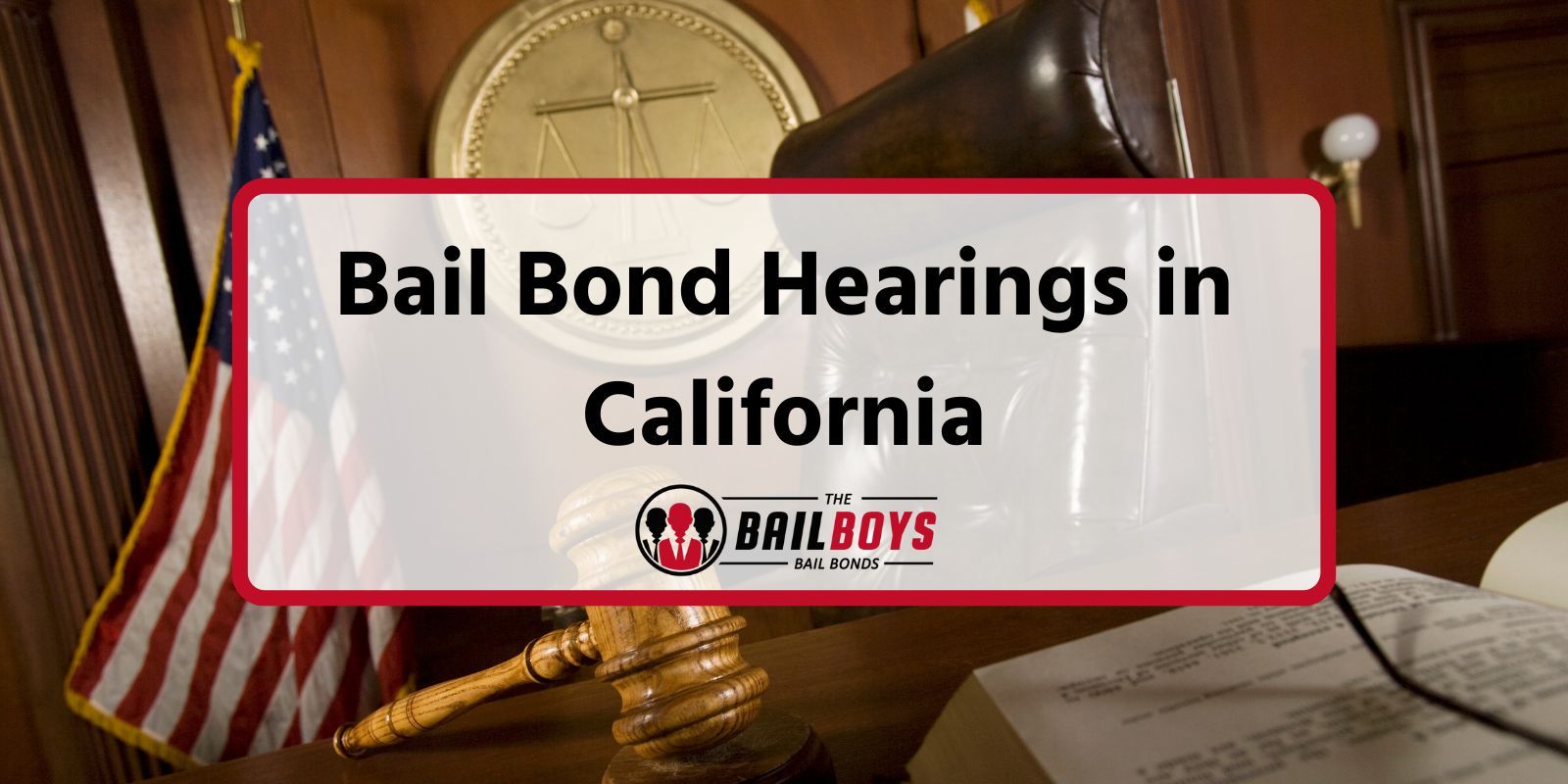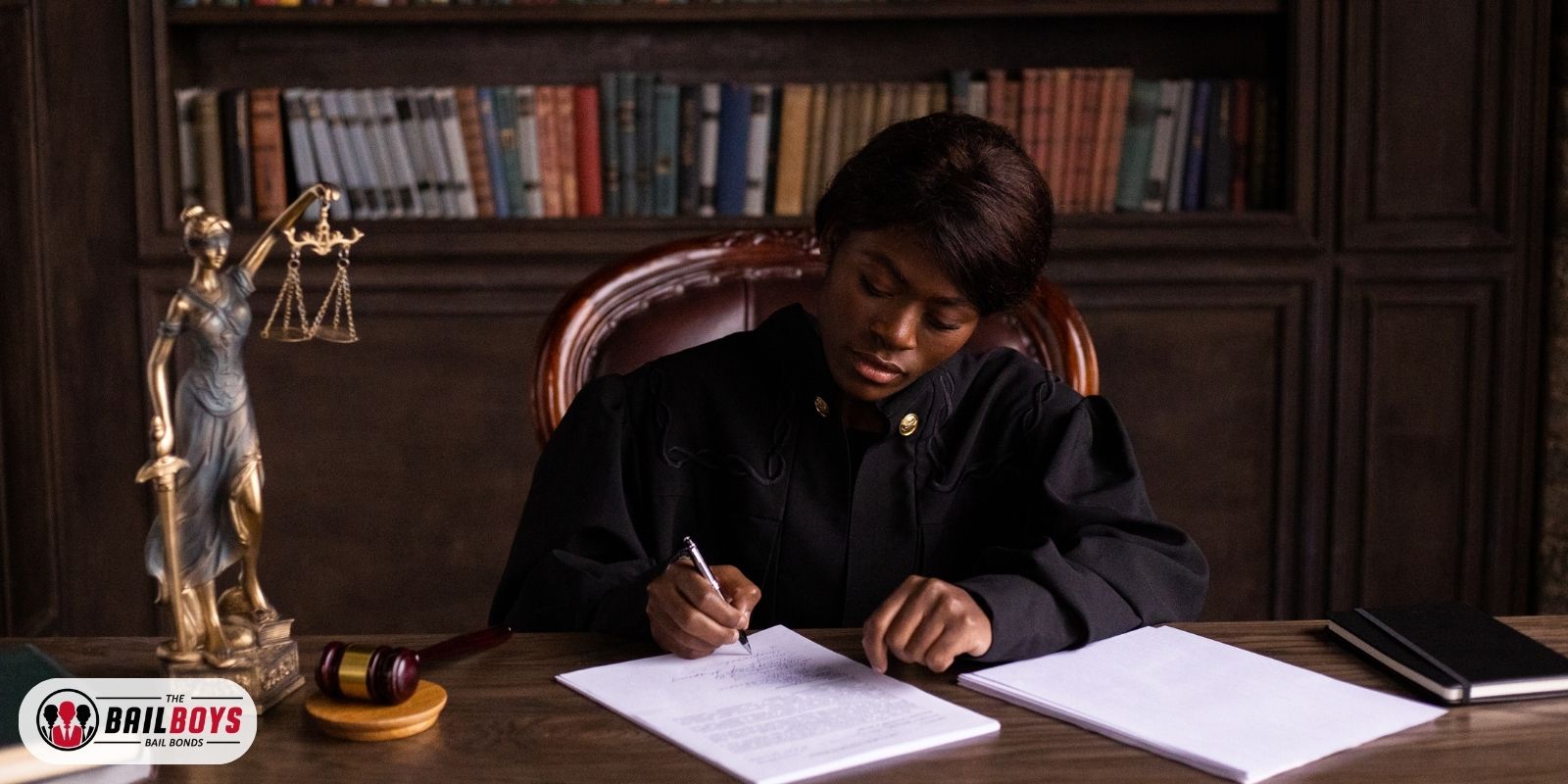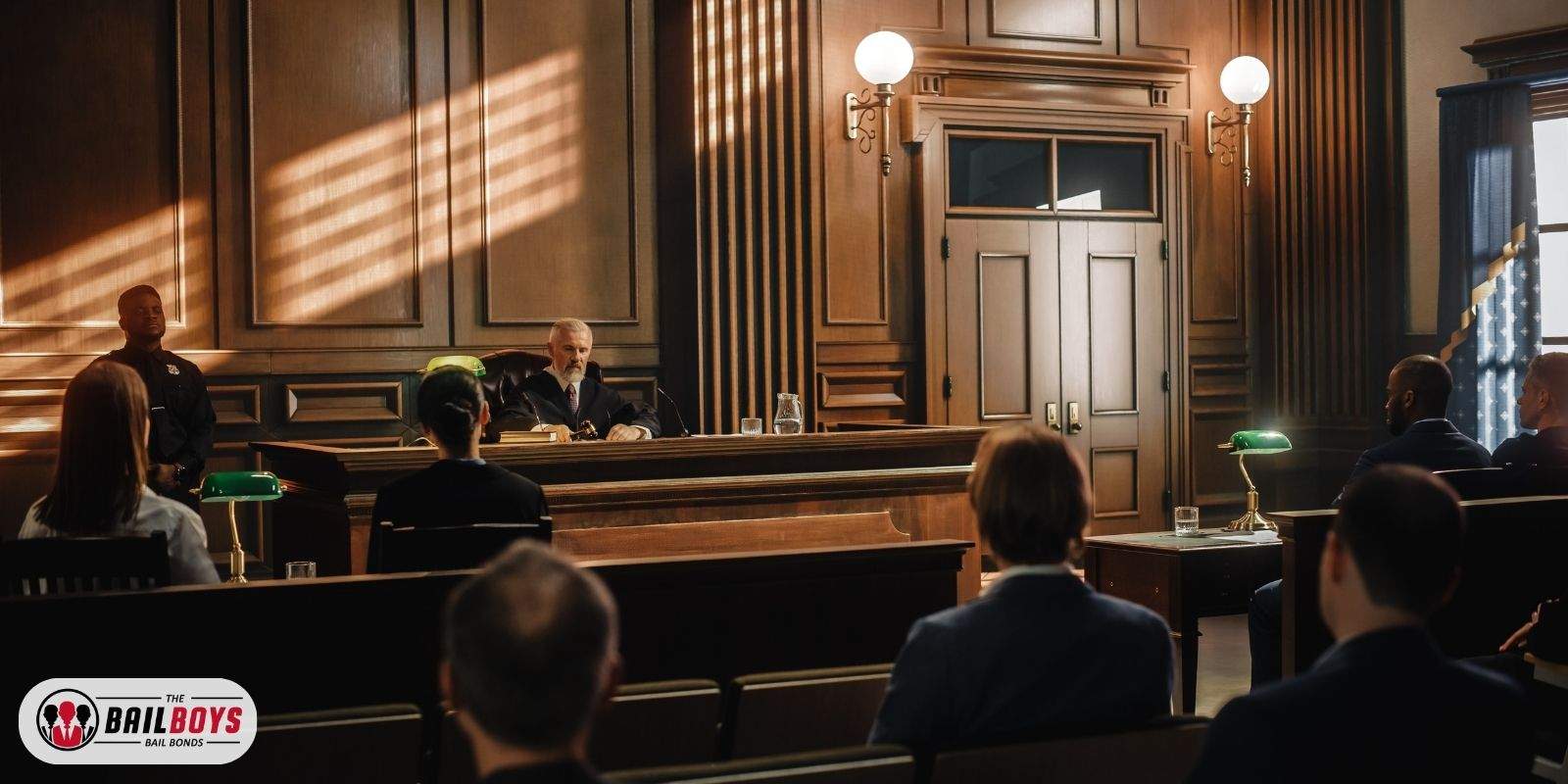
Bail Bond Hearings in California
A bail bond hearing is an important part of the legal process that helps decide whether a defendant gets bail or not. During a bail bond hearing, the judge considers several factors to determine if the defendant is eligible for bail and, if so, the amount required for their release. The bail serves as a financial guarantee that the defendant will return to court for the scheduled court appearances.
Depending on the nature of the case, the defendant sometimes may not be able to afford the bail set during a bail bond hearing.
If you cannot post bail, reach out to our team of professional bail bondsman at The Bail Boys. We offer several payment options and will help you find the right one that will fit into your budget. You just need to schedule a free consultation with us – Let’s discuss your bail and guide you throughout the process.
In this article you’ll get to understand the process of a bail bond hearing, the parties involved in the process, types of bail, how bail amounts are determined, as well as pro tips on how to go about a successful bail bond hearing.
What is a Bail Bond Hearing?
A bail bond hearing is a court proceeding where a judge decides if a defendant can be released from jail until their trial. In the bail hearing, the court assesses the nature and circumstances of the alleged offense. More serious charges might lead to higher bail amounts or even a denial of bail. The judge also considers the strength of the evidence against the defendant; strong evidence could result in a higher bail to ensure the defendant’s appearance at trial.
The judge must also assess the risk the defendant might pose to public safety. If there’s a significant risk, they may set very high bail or not grant bail at all. Additionally, the court considers the defendant’s financial resources to set a bail amount that is significant enough to ensure the defendant’s compliance with court appearances without being unduly burdensome.
This process is based on the Eighth Amendment of the United States Constitution, which prohibits excessive bail and cruel and unusual punishment.
The Bail Bond Hearing Process
The bail bond hearing process involves several steps to determine if an accused person can be released from custody while awaiting trial. After someone is arrested and charged with a crime, a bail bond hearing is scheduled. This typically happens shortly after the arrest.
Before the hearing, both the defense and the prosecution prepare by gathering information about the case and the defendant’s background. The relevant information may include the nature of the crime, the accused’s criminal records, ties to the community, flight risk, etc.
During the bail bond hearing, both the prosecution and the defense have the opportunity to present their arguments regarding the defendant’s release. For instance, in a criminal court case, the prosecuting attorney may argue for a high bail amount or for the defendant to be held without bail. To support their claims, they may cite the defendant’s flight risk or danger to the community.
On the other hand, the criminal defense attorney may argue for a bail reduction or release on their own recognizance. They usually emphasize factors such as the defendant’s ties to the community, no criminal records, and the nature of the charges to back up their plea.
After hearing arguments from both sides, the judge sitting over the bail hearing makes a decision – whether to grant bail and how much to set as the bail amount. Before deciding, the judge considers several factors such as how severe the offense is, the evidence against the defendant, the defendant’s previous criminal record, community ties, potential risks they might pose to the public, and their financial ability to post bail.
The aim of the judge is to make sure that the bail amount reflects the need to protect the community. They also seek to ensure the defendant’s appearance on future court dates while also respecting the defendant’s rights.
If the judge grants bail, they set the bail amount based on the considerations discussed. Then, the defendant posts bail through cash, a bail bond (secured through a bail bond agent), or property, depending on the court’s requirements. Sometimes, the judge may decide on conditions for release in addition to, or instead of, financial bail. These conditions might include travel restrictions, electronic monitoring, or regular check-ins with a court officer.
Posting bail allows the defendant to be released from custody while awaiting trial. However, if the defendant fails to appear on scheduled court dates, the bail can be revoked, the bail money or collateral forfeited, and additional charges may be filed against the defendant.
The bail bond hearing process is a balance between ensuring public safety, the proper administration of justice, and the rights of the accused. It provides a way for defendants to maintain their freedom temporarily, under the condition that they comply with the judicial process and appear for their trial and any other required court appearances.
How Are Bail Amounts Determined in California?
In California, judges use a predetermined list of bail amounts, known as a bail schedule, to determine the bail amount. The bail schedule serves as a starting point for setting bail amounts for a wide range of offenses. Different counties in California have their own bail schedules that outline standard bail amounts for various crimes. The goal is to establish some consistency in how bail is initially determined. So, a panel of judges reviews the bail schedule annually to be sure the court system maintains fairness while setting bail.
However, judges have the authority to modify bail amounts above or below the suggested amounts in the bail schedule based on the uniqueness of each case.
Participants in a Bail Bond Hearing
In a California bail hearing, there are many kinds of participants, each playing different roles. The key participants include:
- Judge: The presiding official who makes decisions on bail amounts and conditions of release.
- Prosecutor: Arguing against the release of the defendant or for a higher bail amount to ensure public safety and the defendant’s future court appearances.
- Defense Attorney: Represents the defendant, arguing for lower bail or for the defendant to be released on his or her own recognizance.
- Defendant: The person accused of the alleged crime, whose bail is being decided.
- Bailiff: A court officer responsible for maintaining order and security in the courtroom.
- Court Reporter: Records a verbatim report of all spoken words during the hearing for legal documentation.
- Victim(s): The alleged victim may be present in some cases to provide testimony or statements that could influence the judge’s decision on bail.
- Family Members or Supporters of the Defendant: May attend to show support for the defendant and sometimes provide testimony regarding the defendant’s character or ties to the community.
What is the Role of a Bail Bondsman in a Bail Bond Hearing?
A bail bondsman, also known as a bail bond agent, plays a significant but indirect role in the bail bond hearing process. Although they do not participate directly in bail hearings, their services may come in handy after the judge sets bail.
If a defendant cannot afford bail, they might get to a bail bond agent to post bail on their behalf. The defendant pays the bail bond agent a non-refundable premium, typically around 10% of the bail amount. In turn, the bondsman agrees to pay the full bail amount to the court if the defendant skips bail or fails to appear for their court proceedings.
If you need an experienced bail bondsman in Los Angeles County or other counties within California, do not hesitate to reach out to us at The Bail Boys. With our no-money-down bail bonds and other affordable payment plans, you can get your bail bonds with no cash at hand. Just schedule a free consultation with us let’s get you started.
Strategies for a Successful Bail Bond Hearing
As a defendant, you need to prepare well for your bail bond hearing to secure your bail under the most favorable terms possible. Some strategies you can employ for a successful bail hearing include:
1. Hire an Experienced Defense Attorney
To skillfully argue for bail reduction or release on your own recognizance, you need an attorney with local legal expertise. For instance, if you’re facing criminal charges in California, a California criminal defense attorney can help present your evidence and arguments in a way that will reduce the weight of your charges.
2. Prepare a Strong Argument for Release
This includes gathering evidence of the defendant’s strong ties to the community, stable employment, family responsibilities, and lack of flight risk. Demonstrating that the defendant is not a danger to the public or a flight risk can convince the judge to set a lower bail amount or release the defendant on their own recognizance.
3. Show Positive Character References
To support your claims, you can provide letters or statements from respected community members, employers, family, and friends that speak to your character and reliability. If applicable, emphasize your clean or minimal criminal record, especially if you’re arrested for serious or violent felonies. This can support an argument for you being a low risk for flight or non-appearance.
4. Propose Conditions for Release
Part of the primary concerns of the court about bail is the defendant failing to appear in court or posing a risk to the community. Suggesting reasonable conditions for release, such as travel restrictions, regular check-ins with law enforcement, drug and alcohol testing, or electronic monitoring, can help alleviate these concerns.
5. Understand the Importance of Court Appearances
The defendant and his or her attorney should be prepared to demonstrate a clear understanding of the bail conditions. They should also express a proper understanding of the importance of complying with all court requirements, including attending all scheduled court dates.
6. Be Professional and Respectful in Court
The attitude of both the defendant and their representatives during the hearing can impact the judge’s perception and decisions. So, it’s best to be respectful, professional, and articulate when presenting arguments or answering questions.
7. Plan the Financial Aspect
If you’re planning to use a bail bondsman, understand the terms and be prepared to discuss how the bail will be secured financially without implying a flight risk.
Why is Presenting a Strong Case Importance for Release?
Presenting a strong case for the defendant’s release can influence the judge’s decision. It demonstrates the defendant’s trustworthiness, stability, and commitment to following the conditions of release. Ultimately, it may increase the likelihood of a favorable outcome in the bail bond hearing. These tips would help:
Character Witnesses: Present character witnesses who can vouch for the defendant’s integrity and reliability within the community.
Stability and Responsibility: Emphasize the defendant’s stable living situation, employment, and responsibilities that demonstrate their commitment to abiding by the conditions of release.
Compliance Assurance: Offer a solid plan to ensure the defendant’s compliance with court appearances, such as regular check-ins, electronic monitoring, or other suitable measures.
What Happens After the Bail Bond Hearing?
The next steps after a bail bond hearing depend on the outcome of the proceeding. If the defendant is granted bail, the next step is to post bail by cash, property bond, or through a bail bond agent. Remember that bail bondsmen charge a non-refundable fee, usually around 10% of the bail amount.
If bail is denied or cannot be posted, the individual will remain in custody until their court date, unless the decision is appealed or a bail review hearing is granted.
Need a Bail Bondsman?
The joy of a successful bail bond hearing can be cut short if there’s no money to post bail. Our expert bail bondsmen have got you covered! We understand how important it is to secure your one’s freedom from jail as soon as possible. And with our affordable payment plans, money should not stand in the way of your freedom from jail. Contact us today – let’s discuss your bail needs and help you come out of detention immediately.







